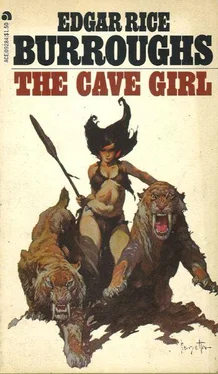Edgar Burroughs - The Cave Girl
Здесь есть возможность читать онлайн «Edgar Burroughs - The Cave Girl» весь текст электронной книги совершенно бесплатно (целиком полную версию без сокращений). В некоторых случаях можно слушать аудио, скачать через торрент в формате fb2 и присутствует краткое содержание. Жанр: Боевая фантастика, на английском языке. Описание произведения, (предисловие) а так же отзывы посетителей доступны на портале библиотеки ЛибКат.
- Название:The Cave Girl
- Автор:
- Жанр:
- Год:неизвестен
- ISBN:нет данных
- Рейтинг книги:5 / 5. Голосов: 1
-
Избранное:Добавить в избранное
- Отзывы:
-
Ваша оценка:
- 100
- 1
- 2
- 3
- 4
- 5
The Cave Girl: краткое содержание, описание и аннотация
Предлагаем к чтению аннотацию, описание, краткое содержание или предисловие (зависит от того, что написал сам автор книги «The Cave Girl»). Если вы не нашли необходимую информацию о книге — напишите в комментариях, мы постараемся отыскать её.
The Cave Girl — читать онлайн бесплатно полную книгу (весь текст) целиком
Ниже представлен текст книги, разбитый по страницам. Система сохранения места последней прочитанной страницы, позволяет с удобством читать онлайн бесплатно книгу «The Cave Girl», без необходимости каждый раз заново искать на чём Вы остановились. Поставьте закладку, и сможете в любой момент перейти на страницу, на которой закончили чтение.
Интервал:
Закладка:
As he stood helplessly staring with bulging eyes at the awful figure glowering at him from the forest his jaw dropped, his knees trembled, and he seemed about to collapse from sheer terror.
Then the hideous man crouched and came creeping warily toward him.
With an agonized scream Waldo turned and fled toward the cliff. A quick glance over his shoulder brought another series of shrieks from the frightened fugitive, for it revealed not alone the fact that the awful man was pursuing him, but that behind him raced at least a dozen more equally frightful.
Waldo ran toward the cliffs only because that direction lay straight away from his pursuers. He had no idea what he should do when he reached the rocky barrier—he was far too frightened to think.
His pursuers were gaining upon him, their savage yells mingling with his piercing cries and spurring him on to undreamed-of pinnacles of speed. As he ran, his knees came nearly to his shoulders at each frantic bound; his left hand was extended far ahead, clutching wildly at the air as though he were endeavoring to pull himself ahead, while his right hand, still grasping the cudgel, described a rapid circle, like the arm of a windmill gone mad. In action Waldo was an inspiring spectacle.
At the foot of the cliff he came to a momentary halt, while he glanced hurriedly about for a means of escape; but now he saw that the enemy had spread out toward the right and left, leaving no means of escape except up the precipitous side of the cliff. Up this narrow trails led steeply from ledge to ledge.
In places crude ladders scaled perpendicular heights from one tier of caves to the next above; but to Waldo the thing which confronted him seemed absolutely unscalable, and then another backward glance showed him the rapidly nearing enemy; and he launched himself at the face of that seemingly impregnable barrier, clutching desperately with fingers and toes.
His progress was impeded by the cudgel to which he still clung, but he did not drop it; though why it would have been difficult to tell, unless it was that his acts were not purely mechanical, there being no room in his mind for aught else than terror.
Close behind him came the foremost cave man; yet, though he had acquired the agility of a monkey through a lifetime of practice, he was amazed at the uncanny speed with which Waldo Emerson clawed his shrieking way aloft.
Half-way up the ascent, however, a great hairy hand came almost to his ankle. It was during the perilous negotiation of one of the loose and wobbly ladders—little more than small trees leaning precariously against the perpendicular rocky surface—that the nearest foe-man came so close to the fugitive; but at the top chance intervened to save Waldo, for a time at least. It was at the moment that he scrambled frantically to a tiny ledge from the frightfully slipping sapling. In his haste he did by accident what a resourceful man would have done by intent—in pushing himself onto the ledge he kicked the ladder outward—for a second it hung toppling in the balance, and then with a lunge crashed down the cliff’s face with its human burden, in its fall scraping others of the pursuing horde with it.
A chorus of rage came up from below him, but Waldo had not even turned his head to learn of his temporary good fortune. Up, ever up he sped, until at length he stood upon the topmost ledge, facing an overhanging wall of blank rock that towered another twenty-five feet above him to the summit of the bluff.
Time and again he leaped futilely against the smooth surface, tearing at it with his nails in a mad endeavor to climb still higher. At his right was the low opening to a black cave, but he did not see it—his mind could cope with but the single idea: to clamber from the horrible creatures which pursued him. But finally it was borne in on his half-mad brain that this was the end—he could fly no farther—here, in a moment more, death would overtake him.
He turned to meet it, and below saw a number of the cave men placing another ladder in lieu of that which had fallen. In a moment they were resuming the ascent after him. On the narrow ledge above them the young man stood, chattering and grinning like a madman. His pitiful cries were not punctuated with the hollow coughing which his violent exercise had induced.
Tears rolled down his begrimed face, leaving crooked, muddy streaks in their wake. His knees smote together so violently that he could barely stand, and it was into the face of this apparition of cowardice that the first of the cave men looked as he scrambled above the ledge on which Waldo stood.
And then, of a sudden, there rose within the breast of Waldo Emerson Smith-Jones a spark that generations of overrefinement and emasculating culture had all but extinguished—the instinct of self-preservation by force. Heretofore it had been purely by flight. With the frenzy of the fear of death upon him, he raised his cudgel, and, swinging it high above his head, brought it down full upon the unprotected skull of his enemy.
Another took the fallen man’s place—he, too, went down with a broken head. Waldo was fighting now like a cornered rat, and through it all he chattered and gibbered; but he no longer wept.
At first he was horrified at the bloody havoc he wrought with his crude weapon. His nature revolted at the sight of blood, and when he saw it mixed with matted hair along the side of his cudgel, and realized that it was human hair and human blood, and that he, Waldo Emerson Smith-Jones, had struck the blows that had plastered it there so thickly in all its hideousness, a wave of nausea swept over him, so that he almost toppled from his dizzy perch.
For a few minutes there was a lull in hostilities while the cave men congregated below, shaking their fists at Waldo and crying out threats and challenges. The young man stood looking down upon them, scarcely able to realize that alone he had met savage men in physical encounter and defeated them. He was shocked and horrified; not, odd to say, because of the thing he had done, but rather because of a strange and unaccountable glow of pride in his brutal supremacy over brutes. What would his mother have thought could she have seen her precious boy now?
Suddenly Waldo became conscious from the corner of his eye that something was creeping upon him from behind out of the dark cave before which he had fought. Simultaneously with the realization of it he swung his cudgel in a wicked blow at this new enemy as he turned to meet it.
The creature dodged back, and the blow that would have crushed its skull grazed a hairbreadth from its face. Waldo struck no second blow, and the cold sweat sprang to his forehead when he realized how nearly he had come to murdering a young girl. She crouched now in the mouth of the cave, eying him fearfully. Waldo removed his tattered cap, bowing low.
“I crave your pardon,” he said. “I had no idea that there was a lady here. I am very glad that I did not injure you.”
There must have been something either in his tone or manner that reassured her, for she smiled and came out upon the ledge beside him.
As she did so a scarlet flush mantled Waldo’s face and neck and ears—he could feel them burning. With a nervous cough he turned and became intently occupied with the distant scenery. Presently he cast a surreptitious glance behind him.
Shocking! She was still there. Again he coughed nervously.
“Excuse me,” he said. “But—er—ah—you—I am a total stranger, you know; hadn’t you better go back in, and—er—get your clothes?”
She made no reply, and so he forced himself to turn toward her once more. She was smiling at him.
Waldo had never been so horribly embarrassed in all his life before—it was a distinct shock to him to realize that the girl was not embarrassed at all.
Читать дальшеИнтервал:
Закладка:
Похожие книги на «The Cave Girl»
Представляем Вашему вниманию похожие книги на «The Cave Girl» списком для выбора. Мы отобрали схожую по названию и смыслу литературу в надежде предоставить читателям больше вариантов отыскать новые, интересные, ещё непрочитанные произведения.
Обсуждение, отзывы о книге «The Cave Girl» и просто собственные мнения читателей. Оставьте ваши комментарии, напишите, что Вы думаете о произведении, его смысле или главных героях. Укажите что конкретно понравилось, а что нет, и почему Вы так считаете.








